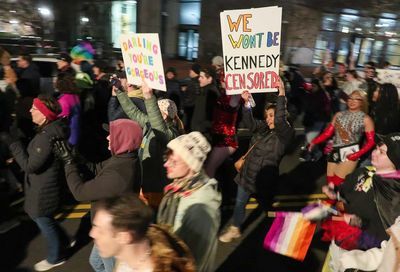32 companies sign onto amicus brief supporting Florida transgender student
Companies argue anti-LGBTQ policies will harm ability to retain quality employees and do business in certain areas

The Human Rights Campaign, on behalf of 32 major companies, has filed a “friend of the court” brief with the 11th U.S. Circuit Court of Appeals in support of a transgender student in a Jacksonville-area school district who has been barred from using the boys’ restroom.
Drew Adams, a student at Allen D. Nease High School in Ponte Vedra, Fla., sued the St. John’s County School Board to challenge its policy forbidding transgender students from using facilities consistent with their gender identities.
Lawyers for Adams, from Lambda Legal, argue that the policy violates Title IX of the Education Amendments Act of 1972 and the Equal Protection Clause of the U.S. Constitution.
In July 2018, a federal judge ruled in Adams’ favor, finding that the policy was discriminatory and was not necessary to protect cisgender students’ privacy or safety, as the school board claimed. The school system appealed the decision to the 11th Circuit, which will hear the case later this year.
Ahead of that hearing, which has yet to be scheduled, 32 companies are weighing in on the case and urging the 11th Circuit to uphold the lower court’s decision in favor of Adams.
In their brief, the companies, along with HRC, contend that the presence of anti-LGBTQ policies negatively affects their bottom line and makes it harder to retain talent by chasing away prospective employees who are either LGBTQ or are the parents of LGBTQ children.
Among the companies that have signed onto the brief are Airbnb, Apple, eBay, GlaxoSmithKline Google, Kaiser Permanente, Levi Strauss & Co., Mitchell Gold + Bob Williams, Spotify, Xerox Corp. and Yelp. The 32 companies represent about 1.36 million employees and $778 billion in revenue.
HRC filed a similar amicus brief in 2017 in support of Virginia transgender student Gavin Grimm, whose case was scheduled to head to the U.S. Supreme Court.
But the high court sent the case back to the lower court levels after it determined that the 4th Circuit Court of Appeals had narrowly based its finding that Grimm could sue for sex discrimination on guidance from the Obama administration that had since been rescinded by the Trump-run Department of Justice and Department of Education.
“This brief underscores the ongoing commitmen of major U.S. corporations and HRC to the fight for the full protection of the law for all individuals,” Edward Jacobs, a partner at BakerHostetler law firm, which authored the brief on behalf of HRC and the nearly three-dozen companies.
Specifically, the companies argue that St. John’s County’s policy would make it harder for them to retain employees for whom LGBTQ equality is an important issue, thus affecting the companies’ ability to create diverse workplaces that are essential to their success.
The companies also express concern that allowing St. John’s County to discriminate will encourage other municipalities to pass similarly restrictive laws.

“Enforcement of the Policy will allow individual school districts, and indeed any other government entity, to do what the Board has done here — design and implement policies that discriminate against and stigmatize transgender children,” the brief reads.
“Further, enforcement could embolden other local and state governments to enact legislation that also contravenes federal law and restricts transgender people’s access to restrooms that comport with their gender identity, both in the public sphere and in the workplace. This piecemeal approach would result in a geographic patchwork, the borders of which will be defined by the treatment of the transgender community. Such a result will have very real, adverse effects on Amici’s businesses.”
The brief also puts forth the argument that the county’s policy on transgender students does nothing to promote the safety or wellbeing of cisgender students, and could complicate decisions about where a company decides to set up shop, expand, or relocate.
“Allowing governments to discriminate against transgender students will also interfere with Amici’s choice of geographies in which to conduct business. Amici’s employees and customers will not support the siting of business activities in locations — otherwise desirable to Amici –where discrimination is tolerated, or even, as in the case of the Policy, mandated by the government.”
“At this critical moment in the fight for transgender equality, these leading businesses are standing up for the rights and dignity of transgender students,” HRC President Chad Griffin said in a statement. “Policies that target transgender students for discrimination are dangerous and pose a serious risk to these businesses’ employees, their families, and their customers. No student should wake in the morning fearful of bullying or discrimination during the school day ahead — and we thank these companies for their support of transgender young people like Drew Adams.”
Support Metro Weekly’s Journalism
These are challenging times for news organizations. And yet it’s crucial we stay active and provide vital resources and information to both our local readers and the world. So won’t you please take a moment and consider supporting Metro Weekly with a membership? For as little as $5 a month, you can help ensure Metro Weekly magazine and MetroWeekly.com remain free, viable resources as we provide the best, most diverse, culturally-resonant LGBTQ coverage in both the D.C. region and around the world. Memberships come with exclusive perks and discounts, your own personal digital delivery of each week’s magazine (and an archive), access to our Member's Lounge when it launches this fall, and exclusive members-only items like Metro Weekly Membership Mugs and Tote Bags! Check out all our membership levels here and please join us today!

























You must be logged in to post a comment.